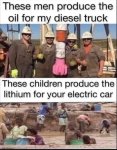Chainbreaker
Well-known member
- 1,802
- 2,009
- 113
- Location
- Oregon
Ok you asked for it and I was curious as well...Whats the carbon footprint on them horses. Likely to get cancelled along with the cows.
JULY 31, 2019 BY HORSES
"What is the carbon footprint of a horse compared to an automobile?
David Mason-Jones in an article in Hoofbeats states that a horse is a carbon “sink”. Interestingly, he states that “the biomass of a horse is a carbon sink in the same way as the biomass of a tree in a forest is a carbon ‘sink.’”
The digestive process of horses produces far less methane than the digestive system of cattle and sheep. Cattle, sheep, and certain other grazing animals are known as ruminants because their gut contains a rumen. The rumen is a part of the ruminant’s digestive system that breaks down tough grasses found in natural pastures. In breaking down the tough grasses, the bacteria in the rumen release large amounts of methane gas. The ruminant animal then belches out the methane gas.
The horse is not a ruminant. The digestive system of a horse cannot break down the tough grasses as a cow or sheep can. The horse has a single stomach which can only deal with easily digestible carbohydrates in grasses. Horses are selective grazers and will not eat the tougher grasses because they cannot digest them. Horses simply produce less methane in their digestive system.
So the horse’s carbon footprint is considerably smaller than an automobile’s."
Of course our 4 horses only equal "4 true HP". Car/truck maintenance = Mechanics, tires & fuel etc. Horse maintenance = Veterinarian, horse shoes & hay etc. Hay prices are going up out here even with it looking like a good hay season this summer its now sitting at ~$26/100 lb bale.
There are no cheap rides anymore!

Last edited:







